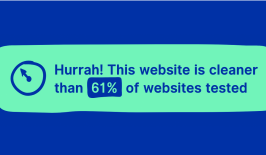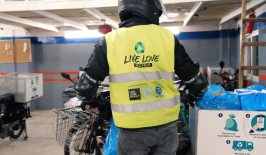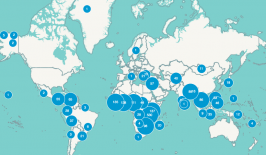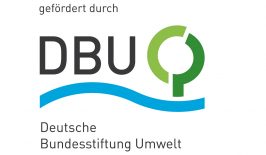The interconnected issues of digitalisation and sustainable development are reaching a wider audience – finally! Last week, Germany’s Environment Minister Svenja Schulze set forth the country’s latest digital agenda – calling for more sustainability in the digital economy and a push for much-needed action for more “digital for good”.
Globally, our use of digital technologies now causes more CO2 emissions and has a bigger impact on global warming than the entire aviation industry. Will digitalisation end up being another motor for the climate crisis? Or can digital tools – when used properly – support the development of a more sustainable world? RESET has been exploring the relationship between the digital transition and sustainability for a long time, and we’ve watched with interest as awareness has also been growing among the wider public in recent years – including among policy makers and advisors. Take last year, for example. In April 2019, the German Advisory Council on Global Change (WBGU) presented its flagship report Towards our Common Digital Future, and the 2019 Re:publica – Europe’s huge annual digital society conference – placed the issue of sustainability front and centre like never before – RESET took to the stage heading up a panel on how sustainable tech innovations can protect forests and rivers, and Germany’s Federal Minister of the Environment, Svenja Schulze, presented a green paper outlining an upcoming digital policy agenda for the environment. The final version of that digital policy agenda, worked on over three weeks with a group of hundreds of experts, was presented in Berlin just last week.
There are many government programmes and agendas that deal with digitalisation. But mostly they look at the topic from an economic perspective – how can digitalisation be used as a driver for development, or as a motor for more economic growth? The 2020 digital agenda, however, takes things in a distinctly different, and more sustainable, direction. “The digital agenda is one of the first official government programmes or ministry initiatives in Europe – perhaps even worldwide – that consistently places the protection of people and nature at the centre of digital policy. The German Environment Ministry is addressing digitalisation as one of the central drivers of energy and resource consumption, but at the same time also as a design opportunity with historic potential to develop solutions for the challenges of the socio-ecological transformation,” explained Dr Stephan Ramesohl, Co-Head of the Digital Transformation Research Unit at the Wuppertal Institute for Climate, Environment and Energy, who worked on the agenda.
Germany’s new digital agenda sets out over 70 individual measures that the country aims to use to steer digitalisation in a direction that is both socially- and environmentally-friendly, and also to drive digital innovations for the good of the climate.
- One key measure is the idea of developing a “digital product passport” for more transparency about the environmental impacts of different products. This would provide information about where the raw materials come from, the working conditions it was produced under, how much CO2 was generated in the process and information about how to recycle it.
- The agenda also calls for the lifespan of smartphones and other electronics to be drastically lengthened, with manufacturers told to provide spare parts and software updates and make it easier for customers to replace elements that often wear out, like screens and batteries.
- Online retailers are encouraged to offer increased transparency about the products they sell by supplying customers with clear sustainability information.
- Online streaming services should adjust their default settings to be more eco-friendly and less energy-intensive, by, for example, reducing the resolution of their videos and not always setting them to play automatically.
- And data centres – the “invisible” carbon-producing power houses that so many of our digital devices rely on – will receive energy-efficiency certificates for achieving cuts in their power consumption or for re-using surplus heat.
- And last but not least, a “Digital Innovation Hub for Climate” will be set up, a space for founders, middle-sized companies and big corporations to come together and work on digital climate innovations together.
Currently, all of these measures are voluntary commitments, relying on everyone involved to take the initiative and change their ways for the good of the planet, rather than a set of laws or binding requirements. This means that companies only have to comply with the changes if they want to – there’s no obligation. “Ultimately, of course, we will need to get to a point where these kind of measures (…) become a systematic and mandatory requirement for all stakeholders. But until we get to that point, we have to take intermediate steps along the way – in the form of voluntary commitments, for example” explains Dr Ramesohl.
One thing is for sure: the coming decade will be crucial for ensuring that digitalisation becomes a force for environmental protection rather than yet another ecological burden. And this digital agenda is evidence that one of Europe’s most powerful countries is finally devoting more attention to these two major challenges and how they interconnect and overlap. But because digitalisation is developing and changing so fast, there are no ready-made solutions. As Dr Ramesohl says, its a question of innovation. “How can we combine social interests, public welfare and the protection of nature and the environment with the potentials and business opportunities provided by digital solutions? (…) We have to develop new solutions, negotiate them and possibly revise them over and over in discussion with others. Making this kind of policy is new, and the digital agenda provides a starting point for this process.”
Europe-wide sustainability laws – like the upcoming ban on single-use plastics – often come into force through individual member states stepping up to take the initiative, encouraging other countries to follow suit and then the rest of Europe follows. Hopefully the new German digital agenda will kickstart a conversation throughout Europe about what we understand by digitalisation for sustainable development – and more importantly, how we hope to take action to make that sustainable digital future a reality.









